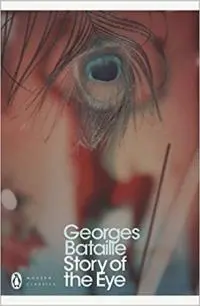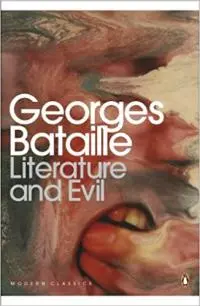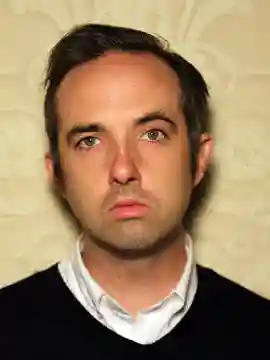Image via Wikipedia Commons
I first discovered Georges Bataille – the French philosopher who would help define transgressive literature – through Story of the Eye, his groundbreaking 1928 novel that explored teenage eroticism, mental illness, and eggs, among other things. Reading Bataille, enriching as it is, often makes one’s head hurt, as if he’s dealt a blow to your brain that causes it to swell. Rest assured, that sensation is merely your mind expanding against what you’ve been previously taught about human nature.
Like my first taste of blood, nothing else would compare at that time – subsequently, I quickly devoured Visions of Excess and The Impossible. None of it was easy reading (especially with the clunky, often redundant translations that comes with assimilating French) but I relished in reading the lines over and over until I made sure I really got what he was throwing down. And while Story of the Eye altered my life, it would be his book of essays, Literature and Evil, that proved more vital to me, because it actually affirmed it.
The book, in which he uses eight authors as inherent springboards of theory, confirmed my personal trajectory, finessing intuitions I wasn't able to put into words; distilling sweeping concepts into urgent bridges of questions/answers, and most importantly, it gave confidence to my own doomed gravitations.
“Literature is not innocent,” says Bataille in the preface. “It is guilty and should admit itself so.” Elsewhere he states, “Literature cannot assume the task of regulating collective necessity… This is the point of my book. I believe that man is necessarily put up against himself and that he cannot recognize himself and love himself to the end unless he is condemned.”
Within this study, he often quotes Sartre, yet omits authors like him and Lautremont from the thesis on grounds that their work is too obvious, so blatantly oozing with Evil it needs no exploration.
What he does with less likely works, such as Emily Bronte’s deceptively romantic Wuthering Heights, is create a thread of similar sentiment to harsher works like de Sade, showing a universal expansion of rebellion, passion, and challenge within literature that could only lead to its condemnation from the religiously dictated/morally-blinded majority, which in turn, only empowers the jagged form.
“How sensual is the act of destruction,” says the executioner in de Sade’s Justine. “I can think of nothing which excites me more deliciously. There is no ecstasy similar to that which we experience when we yield to its divine infamy.” “Had I been born where laws are less strict and tastes less dainty,” says Heathcliff in Wuthering Heights, “I should treat myself to a slow vivisection of those two as an evening’s amusement.”
Elaborating on Bronte, Bataille states: “She had the sort of knowledge which links love not only with clarity but also with violence and death — because death seems to be the truth of love, just as love is the truth of death.” He goes on to further bridge philosophies he laid out in his own book, Erotism. “To reproduce oneself is to disappear… Whether it’s a matter of pure eroticism (love-passion) or of bodily sensuality, the intensity increases to the point where destruction, the death of being, becomes apparent.” “Evil, therefore, if we examine it closely, is not only the dream of the wicked: it is also to some extent the dream of Good.”
When approaching Baudelaire, Bataille quotes Sartre: “He who damns himself acquires a solitude which is a feeble image of the great solitude of the truly free man…” “But who, basically, is Satan?” asks Sartre, “if not the symbol of disobedient and sulky children who want to remain as their parents see them and who do Evil within the bounds of Good in order to assert and consecrate it?)” “The liberty of the child (or the Devil) is evidently limited by the adult (or by God) who turns it to mockery (who diminishes it).”
Back to Bataille’s own perspective, he intuits, “If liberty is the essential quality of poetry, and if free and sovereign behavior deserves no more than a ‘tortured quest,’ the misery of poetry and the bonds imposed by liberty become evident.”
“There is, inherent in poetry, an obligation to turn unsatisfaction into a permanent object. In a first impulse poetry destroys the object which it seizes. By destroying them it returns them to the elusive fluidity of the poet’s existence.”
“The atmosphere of vice, rejection, and hatred correspond to the tension of will which denied the constraint of Good the same way an athlete denies the weight of his dumbbell.”
“Evil, which the poet does not so much perpetuate as he experiences its fascination, is indeed Evil since the will, which can only desire Good, has no part in it.”
 On Jules Michete, author of the 1928 book La Sorciere (otherwise known as Satanism and Witchcraft), Bataille writes: “Michelet was guided by the ecstasy of Evil; he was bewildered by it… the abyss of Evil is attractive independently of the profit to be gained by wicked actions.”
On Jules Michete, author of the 1928 book La Sorciere (otherwise known as Satanism and Witchcraft), Bataille writes: “Michelet was guided by the ecstasy of Evil; he was bewildered by it… the abyss of Evil is attractive independently of the profit to be gained by wicked actions.”
“La Sorciere makes its author appear as one of the men who have spoken most humanly about Evil… not of the Evil which we do by abusing strength at the expense of the weak, but of the Evil which goes against our own interests and which is brought about by a passionate desire for liberty.”
“The witch was the victim who died in the horror of flames. It was natural to reverse the values of the theologians… the witch was the incarnation of suffering humanity, persecuted by the strong…”
“… those arts which sustain anguish and the recovery of anguish within us all are the heirs of religion. Out tragedies and our comedies are the continuation of ancient sacrificial rites.”
“The ritual of witchcraft is the ritual of an oppressed people. The religion of a conquered nation has often become the magic of societies formed as a result of conquest.”
“Humanity pursues two goals – one, the negative, is to preserve life (to avoid death), and the other, the positive, is to increase the intensity of life. These two goals are not contradictory, but their intensity is never increased without danger.”
On abyss poet William Blake, Bataille quotes Nietzche (incidentally, Bataille wrote the biography On Nietzche in 1945), “…many others… have descended into the unconscious as far as Blake but they have not returned. The asylums are full of them; for the modern definition of madman is one who has been overwhelmed by the symbols of the unconscious. Blake is the only one who has ventured as far and returned sane.”
Bataille addresses Blake’s transcendence of extremes, a fascination of evil like moth to flame. “Blake’s mind was open to the truth of Evil which exists beyond sensuality and the feeling of horror which is connected with it… In Blake’s stare I sense both resolution and fear. I also feel it is more difficult to penetrate the abyss which man is for himself more deeply than in this representation of Evil:”
Cruelty has a Human Heart
And jealousy a Human Face
Terror the Human Form Divine
And secrecy the Human Dress
The Human Dress is forged Iron
The Human Form a fiery Forge
The Human Face a Furnace seal’d
The Human Heart its hungry Gorge
— "The Divine Image"
Marquis de Sade would be the most “traditionally” Evil author Bataille covers in Literature and Evil – a man who needs no formal introduction, so he goes right to the source: “You want the whole universe to be virtuous and you do not feel that everything would perish in an instant if there were nothing but virtues on Earth,” says Sade. “You do not understand that, since vice must exist, it is as unjust of you to punish it as it would be to poke fun at a blind man… Enjoy yourself, my friend, enjoy yourself and do not pass judgement, leave to nature the care of moving you as she pleases and to eternity that of punishing you.”
Bataille touches on Sade’s ultimate goal of self-negation: “In an endless and relentless tornado, the objects of desire are invariably propelled towards torture and death. The only conceivable end is possible desire of the executioner to be the victim of torture himself. In Sade’s will, the instinct reached its climax by demanding that not even his tomb should survive: it led to the wish that his very name should vanish from the memory of men.”
 Like Sade, Kafka wished himself erased from history. “Before his death, he did express a decisive wish that all he left be thrown into the fire.” “He chose the unrestrained caprice of his heroes, their childishness and carelessness, their scandalous behavior and obvious lies. In a word, he wanted an irrational world, which escaped classification, to remain supreme, and to provide an existence only possible to the extent of which it called for death…” “Death is the only means of avoiding the abdication of sovereignty. There is no subservience in death, in death there is nothing.”
Like Sade, Kafka wished himself erased from history. “Before his death, he did express a decisive wish that all he left be thrown into the fire.” “He chose the unrestrained caprice of his heroes, their childishness and carelessness, their scandalous behavior and obvious lies. In a word, he wanted an irrational world, which escaped classification, to remain supreme, and to provide an existence only possible to the extent of which it called for death…” “Death is the only means of avoiding the abdication of sovereignty. There is no subservience in death, in death there is nothing.”
“Life, and above all politics, are surely a struggle,” says Proust, “And since the wicked carry every weapon, it is the duty of the righteous to carry the same weapons. We could almost say… that justice perishes because it is inadequately armed.”
Bataille cites Proust most prominent work, the seven-volume Remembrance of Things Past: “In A la Recherche du temps perdu, the evidence of Marcel’s cynicism accumulates when jealousy drives him to torturous maneuvers. But these very different forms of behavior, which initially seem to exclude each other, merge. If we had no scruples, if we did not care to observe rigid taboos, we would not be human beings. But we are unable to observe these taboos forever – if we did not occasionally have the courage to break them, we would find ourselves in a cul-de-sac… We ridicule the contradiction between war and the universal taboo which condemns murder, but war, like the taboo, is universal. Murder is always laden with horror, while acts of war are always considered valorous. In certain places taboos have indeed been rigorously observed, but the timid man, who never breaks the law, who turns away, is everywhere despised.”
“I was sixteen,” said Jean Genet. “There was no place in my heart where I could lodge the feeling of my innocence. I admit to being the coward, the traitor, thief, queen which I was held to be… and experienced the amazement of knowing that I was comprised of filth. I became abject… If they can prove that an act is detestable by the evil it causes, I alone can judge its beauty and elegance from the lyricism it arouses in me. I alone can refuse or accept it.”
Bataille sees Genet as the spokesman for Evil’s ultimate conundrum, a fascinating game no one ever wins since the concept of “triumph” should be left to Good’s own eager-to- please hypocrisies: “…the tragic bond between punishment and sovereignty: Genet can only be sovereign in Evil; sovereignty itself may be Evil, and Evil is never surer of being Evil than when it is punished.”
“The attraction of sin is the essence of his excitement, but what if he denies the legitimacy of the taboo, what if the sin fails him… a potentially unlimited desire for nothingness is reduced to vain agitation. What is vile is glorified, but Evil becomes pointless. That which wanted to be Evil is no more than a form of Good, and since its appeal was dependent on its power to destroy, it disappears in fulfilled destruction.”
Get Literature and Evil at Bookshop or Amazon
Get Songs of Innocence and Experience at Amazon

About the author
Gabriel Hart lives in Morongo Valley in California’s High Desert. His literary-pulp collection Fallout From Our Asphalt Hell is out now from Close to the Bone (U.K.). He's the author of Palm Springs noir novelette A Return To Spring (2020, Mannison Press), the dispo-pocalyptic twin-novel Virgins In Reverse / The Intrusion (2019, Traveling Shoes Press), and his debut poetry collection Unsongs Vol. 1. Other works can be found at ExPat Press, Misery Tourism, Joyless House, Shotgun Honey, Bristol Noir, Crime Poetry Weekly, and Punk Noir. He's a monthly columnist for Lit Reactor and a regular contributor to Los Angeles Review of Books.








